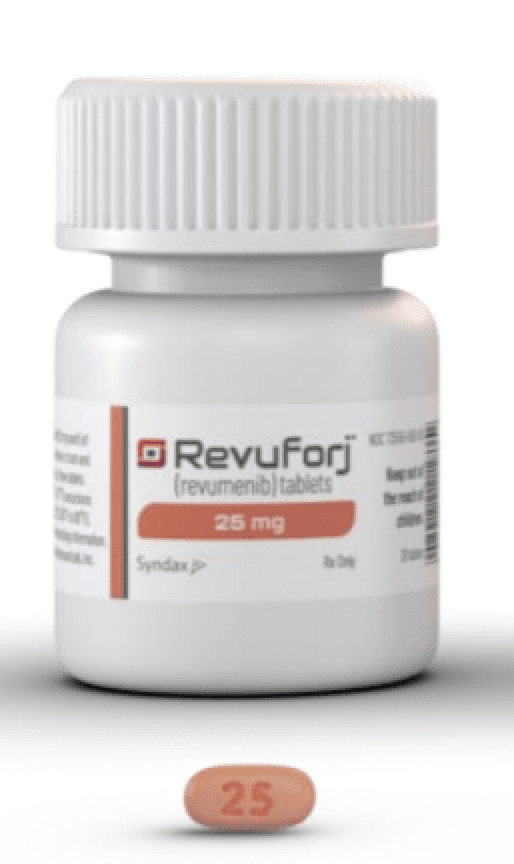Revuforj and Alcohol/Food Interactions
There is 1 alcohol/food/lifestyle interaction with Revuforj (revumenib).
Revumenib Food/Lifestyle
Moderate Food Interaction
High fat content meals may affect the absorption of revumenib. It is recommended that revumenib be taken while fasting or with a low fat meal (approximately 400 calories, with 25% of calories from fat). Grapefruit juice may also increase the blood levels of revumenib which can increase the risk of an irregular heart rhythm that may be serious and potentially life-threatening. You may be more susceptible if you have a heart condition called congenital long QT syndrome, other cardiac diseases, conduction abnormalities, or electrolyte disturbances (for example, magnesium or potassium loss due to severe or prolonged diarrhea or vomiting). Increased levels of [CS1] may also increase the risk of developing a serious and potentially life-threatening condition called differentiation syndrome. Symptoms of differentiation syndrome include: fever, cough, shortness of breath, severe headache, confusion, dizziness, rapid weight gain, swelling, or decreased urination. You should seek immediate medical attention if you develop any of these symptoms and/or symptoms of QT prolongation such as sudden dizziness, lightheadedness, fainting, shortness of breath, or heart palpitations during treatment with revumenib. The risk and/or severity of other side effects may also increase, including nausea, vomiting, diarrhea, fever or infections. You may need additional monitoring if grapefruit or grapefruit juice are consumed during treatment with revumenib. Talk to a healthcare provider if you have any questions or concerns. It is important to tell your doctor about all other medications you use, including vitamins and herbs. Do not stop using any medications without first talking to your doctor.
Switch to professional interaction data
Revuforj drug interactions
There are 563 drug interactions with Revuforj (revumenib).
Revuforj disease interactions
There are 2 disease interactions with Revuforj (revumenib) which include:
More about Revuforj (revumenib)
- Revuforj consumer information
- Check interactions
- Compare alternatives
- Pricing & coupons
- Drug images
- Side effects
- Dosage information
- During pregnancy
- FDA approval history
- Drug class: miscellaneous antineoplastics
- Breastfeeding
- En español
Related treatment guides
Drug Interaction Classification
| Highly clinically significant. Avoid combinations; the risk of the interaction outweighs the benefit. | |
| Moderately clinically significant. Usually avoid combinations; use it only under special circumstances. | |
| Minimally clinically significant. Minimize risk; assess risk and consider an alternative drug, take steps to circumvent the interaction risk and/or institute a monitoring plan. | |
| No interaction information available. |
See also:
Further information
Always consult your healthcare provider to ensure the information displayed on this page applies to your personal circumstances.


